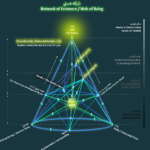Why did Fatima Zahra go behind the door when Ali was at home?
[vc_row][vc_column][vc_column_text]
Brief answer:
According to the documentary sources, Fatimah Zahra’s intention of coming behind the door was to close the door and prevent the attackers from entering the house, because she was present near the door, saw the attack of the attackers and immediately took action to close the door.
Detailed answer:
It must be said that in fact, the Sunnis want to complete two tasks for their own benefit with this doubt;
First: Put a weakness and defect for Amir al-Mu’minin Ali (pbuh) that why Ali (pbuh) did not have honor and sent a woman behind the door and did not go himself.
Second: To clear Umar’s lap of this audacity and with these projections, pretend that this case is false and far from the dignity of Umar. Regarding the first goal, it should be said that:
First, they say that Hazrat Ali was to defend all the oppressed, especially to defend his own honor, because the wife is considered the red line of every person, the most despicable people where a woman and If they see their children in danger, they will not hesitate to sacrifice themselves, so how is it possible that Ali (pbuh) did not defend his own wife, the daughter of the Prophet. This lack of zeal is attributed to someone who has been given the title of “Asadullah Ghalib” “The Victorious Lion of God”, because Hazrat Ali has never been defeated by anyone anywhere. And this is while Alusi, the famous Sunni commentator, writes in “Ruh al-Ma’ani”:
«… غضب عمر وأضرم النار بباب علىّ و أحرقه و دخل فاستقبلته فاطمة و صاحت یا أبتاه و یا رسول الله، فرفع عمر السیف و هو فى غمده فوجأ به جنبها المبارک و رفع السوط فضرب به ضرعها فصاحت یا أبتاه فأخذ علىّ بتلابیب عمر وهزّه و وجأ أنفه و رقبته»؛
Umar got angry and set the door of Ali’s house on fire and entered the house. Fatimah, (pbuh), came to Umar and shouted: “Ya Abatah, O Messenger of Allah!” Umar raised his sword that was in its sheath and went to her side. He hit Fatimah, raised the whip and hit Fatimah’s arm, Fatimah shouted: “Ya Aabtah” – upon seeing this incident – Ali (pbuh) suddenly got up and grabbed Umar’s neck and pulled him hard and knocked him to the ground and hit his nose and neck). Alousi’s narration of this case, whatever his intention, shows that Ali (pbuh) has shown a strong reaction in defending the daughter of the Prophet (peace be upon him and his family) from himself. [1]
Secondly, As Sunnis, they consider the knowledge of the unseen only for God, we also say that we do not know the knowledge of the unseen and we do not know why Hazrat Zahra (pbuh) came behind the door. But it can be pointed out that maybe the coming of Hazrat Zahra (pbuh) is for this, so that the attackers will be ashamed of the only daughter of the Prophet (peace be upon him and his family), the one about whom the Prophet said, Whoever makes Fatima angry has made me angry. In addition, at the same time, not only this presence of Fatimah at the door prevents them out of shame but also they made boldness that today is a question for many Sunni scholars as to why this boldness was done with the daughter of the Prophet (peace be upon him and his family) by those who called themselves caliphs.
Regarding the second goal, we say that when the main story of the attack has been proven, the question of why this did not come instead of that will not clean anyone’s lap, because many Sunni scholars, including historians, hadith scholars, and commentators, have given the origin of the case of Hattāki and the story of the invasion in their books, which we mention here by quoting some of them:
Muhammad Bin Jarir Al-Tabari (died 310), a prominent Sunni jurist and historian, describes the terrible event of the desecration of the House of Revelation in his history as follows:
«أَتَى عُمَرُ بنُ الْخَطّاب مَنْزِلَ عَلىّ وَ فِیهِ طَلْحَهَ وَ الزُّبَیْرُ وَ رِجالٌ مِنَ الْمُهاجِرینَ، فَقَالَ وَ اللّهِ لأُحُرِقَنَّ عَلَیْکُمْ أَوْ لَتُخَرجُنّ إِلى البَیْعَهِ، فَخَرَجَ عَلَیْهِ الزُّبَیرُ مُصلِتاً بِالسَّیْفِ فَعَثَرَ فَسَقَطَ السَّیْفُ مِنْ یَدِهِ، فَوَثَبُوا عَلَیْهِ فَأَخَذُوهُ»؛[2]
“Umar bin Al-Khattab came to the house of ‘Ali, and to him was Talha and al-Zubayr, and men from among the Muhajirin, who wrote for the sake of God.” They said, “I swear to God, I will set the house on fire unless you come out to pledge allegiance.” Zubayr came out of the house with a sword in his hand, suddenly his foot slipped and the sword fell from his hand to the ground. At this time, others attacked him and took the sword from his hand.
Also, Abdul-Fattah Abdul-Maqsood mentions the main point of the case – the attack on the House of Revelation – in two cases, and we limit ourselves to quoting one of those two words.
He says that Umar – in that case of the attack – said: I Swear to the one whose Umar’s life is in his hands, you should come out, or I will set fire to the house on its inhabitants. – They said: O Aba Hafs, Fatima is in this house. Umar recklessly shouted: Let it be! He approached, knocked on the door, then knocked on the door and entered the house… Ali (pbuh) was found… Zahra’s voice echoed near the entrance of the house”.[3]
And it is also stated in the book of Ithbat al Wassiyyah: Umar and some people went to the door of Fatima’s house (pbuh). They took a lot of firewood to the house of Fatima (pbuh). Bani Hashim, including Abbas, the Prophet’s uncle, Ali, (pbuh), and Zubair were there. Umar said: Come out and pledge allegiance to the caliph, Abu Bakr, or I will burn you. Umar said to Fatimah (pbuh): Take out whoever is in the house. Zubair drew his sword and Umar said: Take this dog, they took his sword and hit it on a stone and it broke. Bani Hashim refused to come out. Umar asked for firewood and said: To the God in whose power is Umar’s life, either come out, or I will burn the house with whoever is there. The people said: Oh Aba hafs! – Umar’s nickname was Abahafs – Fatima (pbuh) is in this house. Umar replied: I will burn whoever is there… then Fatimah (pbuh) said in a loud voice: “O Father and O Prophet of God!” Look what will happen to us after you from Umar and Abu Bakr.” The people returned after hearing the wailing and crying of Fatimah (pbuh), but Umar and some others remained there.[4]
Many Sunni scholars have also narrated the incident of desecration and the attack on the house of revelation, which can be referred to the following people:
-
- Abu Obeid in the Book of Wealth, p. 195;
2; Muhammad ibn Sa’ad in the book of Tabaqat al-Kubra, vol. 8, p. 27;
-
- Ibn Abd Rabbah in al-Aqd al-Farid, vol. 4, p. 263;
-
- Mas’oudi in Moruj al-Dhahab, vol. 2, p. 301;
-
- Ibn Asaker in the brief history of Madinah, Damascus, vol. 13, p. 222, published by Dar al-Fikr.
Endnotes:
[1] Tafsir Alūsi, vol. 3, p. 124.
[2] Tabari’s history, vol. 2, p. 443, Beirut edition.
[3] Imam Ali ibn Abi Talib, vol. 4, p. 2. 274. Diwan Muhammad Hafiz Ibrahim: vol. 1, p. 82.
[4] Proof of will, p. 143; Al-Wafi Bil Wafayat, vol. 6, p. 17; Al-Milal and Al-Nihal, vol. 1, p. 57.
[/vc_column_text][/vc_column][/vc_row]








